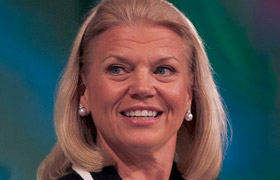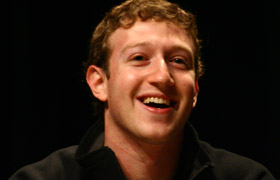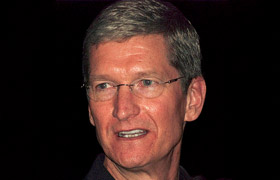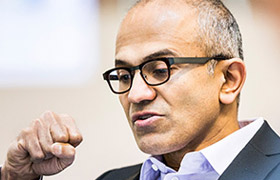
As is customary at this time of the year, TechCentral is pleased to present its lists of who it considers are the biggest technology newsmakers over the past 12 months, both internationally and in South Africa.
We kick it off, as always, with the five people the publication’s editors believe were the biggest newsmakers in the technology space in 2014 worldwide. Later this week, we’ll publish our South African technology newsmakers of the year.
Lists like this are, of course, subjective, but they’re our attempt to highlight the people we believe deserve the title of “newsmaker of the year”.

 Ginni Rometty
Ginni Rometty
Rometty is the first woman to head Big Blue. Her role has not been an easy one given IBM’s declining revenue and the promises made to investors by her predecessor, Sam Palmisano, that the company would achieve US$20 in earnings per share in the 2015 financial year. Indeed, Rometty said last month that the company would not meet Palmisano’s stretch target. But this, say analysts, is a good thing for Rometty, who will now be able to focus on other, more important things.
Rometty has, however, been boxing clever this year. Her strategy of investing in new technologies is likely to pay dividends. And IBM’s strategic partnership with Apple and her pledge to invest $1bn in cognitive computing systems — a big focus area for the company — are smart moves.

 Mark Zuckerberg
Mark Zuckerberg
The Facebook founder, who also happens to be the world’s second youngest self-made billionaire — his personal wealth is estimated to be well north of $30bn — wasn’t out of the news much in 2014. But his audacious, $22bn acquisition of WhatsApp is what got him onto TechCentral’s International Newsmakers list this year.
The instant messaging service generates only $10m/year in revenue, and Zuckerberg says he’s not interested in monetising it until it reaches a billion users. Zuck dreams big!
Facebook this year extended its lead as the world’s most popular and most global social network, in September recording an average of 864m daily active users.
For Zuckerberg, connecting everyone on the planet to the Internet is also a priority. Facebook’s Internet.org initiative wants to get the two thirds of the world’s population who don’t have Internet access online for the first time. This year, Internet.org was launched in Africa, with Kenya, Tanzania and Zambia, giving Airtel customers in those countries zero-rated access to a range of services, including Facebook and Wikipedia.

 Tim Cook
Tim Cook
This has been the year the Apple CEO was able to make his mark on the most successful technology business in world today. The gap left by the late Steve Jobs was undoubtedly a difficult one to fill, but Cook made it his own this year.
Indeed, 2014 was the year Apple introduced its first new product category since Jobs’s passing in 2011. Even though the Apple Watch will be launched only next year, it’s already generating enormous hype and interest from consumers.
Under Cook’s watch (see what we did there?), Apple’s share price has also seen impressive growth. Indeed, it’s doubled since he took the reins. Financial analysts say the company could be the first to reach a market capitalisation of $1 trillion, from $675bn now.
Cook also got onto our list for becoming the first openly gay leader of a Fortune 500 company when he revealed his sexual orientation in a piece penned for Businessweek.

 Travis Kalanick
Travis Kalanick
As Uber’s founder and CEO, Kalanick is the head of one of the most exciting start-ups in years. This year, he entered the Forbes list of the 400 richest Americans at number 290, worth an estimated $3bn. Just four years after it was founded, Uber has already been valued at more than $40bn (overvalued, anyone?) and is operational in 50 countries and 250 cities.
Uber is a service that connects drivers and passengers using a clever app that tracks the taxi as it arrives and handles all payment once the ride is complete.
But Uber has come under fire over its aggressive corporate culture. And it’s been banned in a number of countries around the world, including Thailand and the Netherlands, for alleged noncompliance with local laws.
It was most recently banned in Delhi in India after the alleged rape of a female passenger by an Uber driver. While Uber may be facing a number of mammoth obstacles, it continues to grow around the world, including in South Africa.

 Satya Nadella
Satya Nadella
This is a new-look Microsoft. Breaking its long-standing tradition of putting its Windows operating system above everything else, Nadella is now making the company’s software and services work across a wide array of platforms, including Apple’s iOS and Google’s Android. The changes have been led by Nadella, who took the reins from Steve Ballmer in February, though, to be fair, they were started on Ballmer’s watch. But the Indian-born Nadella has lit a rocket under Microsoft’s transformation in his 10 months at the helm.
If nothing else, there’s growing interest in Microsoft again after many commentators had written it off as a dinosaur of the client-server era of computing. This has translated into its shares climbing by more than 30% since he took the hot seat.
Not all the headlines that Nadella generated this year were positive, though. In October, he was speaking at a women’s technical conference on the topic of women in computing when he said controversially: “It’s not really about asking for the raise, but knowing and having faith that the system will actually give you the right raises as you go along.” There was an international backlash, which forced him into issuing an apology. — © 2014 NewsCentral Media




